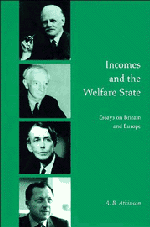Book contents
- Frontmatter
- Contents
- List of figures
- List of tables
- Preface
- Introduction
- I Income inequality and poverty in Britain and Europe
- 1 What is happening to the distribution of income in the UK?
- 2 Income distribution in European countries
- 3 Poverty, statistics and progress in Europe
- 4 Comparing poverty rates internationally: recent studies in OECD countries
- 5 Two nations in early retirement? The case of Britain
- II Analysis of the Welfare State
- III Targeting and the future of social security policy
- Notes
- Bibliography
- Name index
- Subject index
3 - Poverty, statistics and progress in Europe
Published online by Cambridge University Press: 03 May 2011
- Frontmatter
- Contents
- List of figures
- List of tables
- Preface
- Introduction
- I Income inequality and poverty in Britain and Europe
- 1 What is happening to the distribution of income in the UK?
- 2 Income distribution in European countries
- 3 Poverty, statistics and progress in Europe
- 4 Comparing poverty rates internationally: recent studies in OECD countries
- 5 Two nations in early retirement? The case of Britain
- II Analysis of the Welfare State
- III Targeting and the future of social security policy
- Notes
- Bibliography
- Name index
- Subject index
Summary
The first section (3.1) in this chapter will consider the important changes in poverty measurement in Europe. This is the first interpretation of the word ‘progress’ in the title 3.1. There have been significant developments, and our knowledge is substantially better than it was a few years ago. Calculations of the number with incomes below 50 per cent of the national average, taken as a low-income cut-off by the European Community, can now be much more firmly based. At the same time, there are ways in which the methods used in the measurement of poverty need to be advanced, or the emphasis shifted, and the role of future research receives particular attention.
The second interpretation of the word ‘progress’ concerns progress towards the development of the European Community. Here I have in mind not just rates of growth of GNP, but also progress of a more qualitative kind towards greater European unity, including the assessment of poverty on a Community-wide basis rather than relative to national incomes per head. In section 3.2,1 consider the impact of economic growth on poverty in the Community under different assumptions about its assessment.
This brings us to policy, and in the concluding section I am concerned with the relation between poverty statistics and policy. What is the role of statistics such as that of 44 million people in the European Community living at below 50 per cent of national average income? Who should provide such statistics? Who are the intended audience?
- Type
- Chapter
- Information
- Incomes and the Welfare StateEssays on Britain and Europe, pp. 64 - 77Publisher: Cambridge University PressPrint publication year: 1996
- 4
- Cited by



